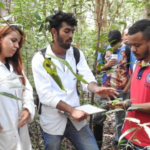
Soili Rinne & Anu Raudasoja
What kind of competence, skills and knowledge do vocational teachers need in the future? Several international and Finnish studies and reports state that globalisation and rapid technological development are changing societies, work tasks and conceptions of work (e.g. OECD, 2019a; Balliester & Elsheikhi, 2018). We discuss how these changes are going to affect Vocational Education and Training (VET) organisations and teachers.
Vocational education and training
The European Centre for the Development of Vocational Training, Cedefop, (2014, p. 292) defines VET as “education and training which aims to equip people with knowledge, know-how, skills and/or competences required in particular occupations or more broadly on the labour market”. In Europe, there are different conceptions of VET. In Finland VET is considered as a part of continuous learning. (Cedefop, 2020, p. 27)
According to the Finnish National Agency for Education (n.d.) the goal of Finnish VET is to enable students to develop as human beings and members of society. VET supports lifelong learning and provides students with skills needed in further studies and employment. It is therefore important that VET Teachers have competence, skills and motivation to guide their students towards these goals. VET teachers have to design support for learning in a broad sense to achieve these goals. The Finnish Innovation Fund Sitra (2019, pp. 3–5) states that competence building should happen in near connection to work and as part of work. It is important to respond to the needs of working life, but it is equally important to notice education and personal growth in a broader meaning and possibilities to increase competence and general skills. (Billett and Pavlova, 2005, p. 196)
New Skills for VET teachers project
This article is written as a part of New Skills for VET Teachers’ project, co-funded by the Erasmus+ Programme. The project team (NSVETT, n.d.) points out that changes in working life, innovations and variable skills requirements change rapidly the role of VET teachers. These changes impact also education systems and learning structures (Prime Minister’s Office, 2019, p.1). This means that the profession of vocational teacher must be in transformation and new solutions need to be found. Teachers’ role has already changed during the last decade; from information provider to coach. Tapani and Salonen (2019, pp. 253–254) state that VET teachers’ competencies are fragmented and this influences also their work identity.
NSVETT project arranged a workshop in March. The workshop focused on what kind of competencies and strengths teachers already have and how can they use their strengths. Also mentoring was mentioned in discussions as a key to support VET teachers’ competences to tackle the future and adopt a multi-faceted appreciation of their skillset. Tapani and Salonen (2019, p. 254) see that there is a need to share expertise, as it is hard or even impossible to possess all competences and skills needed today and in the future.
VET teachers’ roles and competences
The profession of a VET teacher is a dual profession. A profession means that it is respected in the society because of knowledge and expertise through high education and practical training (Konttinen, 1998). As a dual profession, a vocational teacher must justify his or her activities with respect to his own organisation, professional groups, world of work, public opinion and legislature (cf. Pekkola, 2014, p. 95). In this article, we discuss VET teachers’roles and competences referring to a recent study by Raudasoja and Kaitala (2019). They studied VET teachers’ competences in Finland and presented goals for vocational teacher competence in the following figure (translated into English by Anu Raudasoja).

As the figure shows, VET teachers have multi-faceted roles and diverse competence objectives and needs. Raudasoja and Kaitala (2019) found four main competence categories: pedagogical competence, substance competence, innovation expertise and agency and continuous development of one’s own and community’s competence. In all these categories you can notice skills that urge also skills needed in the future and about the future.
Pedagogical competence is urged for example when VET teachers work with their students’ personal competence development plans as the demands of the working life in the future must be taken into consideration. Cooperation with working life provides VET teachers knowledge of the future working life and increase their substance competence. Social, global and ethical issues are more and more also questions about the wanted future. Innovation competence is seen in this figure in its broad meaning, including also developing and applying new knowledge, ideas, strategies and solutions to old and new problems. (See also OECD 2019b, p. 61) A professional teacher is required to have strong agency skills in order to be able to develop practices and create new ways of working.
In the future it is important to be able to learn continuously. Soft and transferable skills have been identified in many studies and reports (e.g. World Economic Forum, 2018) important factors for continuous learning. Different networks of vocational teachers offer the opportunity to learn as part of their own work. Elemental drivers for change in Finnish vocational education and training according to the Ministry of Education and Culture (2019, p.17) are:
- decreasing population within working age,
- renewing working life and ways to work,
- changing competence demand in world of work,
- enhancing customer orientation,
- expanding and enhancing role of vocational education and training,
- changing role and position of VET providers and organisations, and
- varying ways to organize education.
Conclusions
VET teachers have a key role to play in implementing educational change and reforming work practices. In a rapidly changing world of work, there is a need for a variety of ways to organise training in a customer-oriented way so that it is achievable from a continue learning perspective. Competence can be acquired in different learning environments, in which case the teacher’s role as a planner of study paths and as a recogniser of competence may be emphasised in the future. VET teachers have to have competence to guide their students towards future world of work.
Authors
Soili Rinne is a Senior Lecturer at Häme University of Applied Sciences (HAMK), HAMK Edu Research Unit. She works in New skills for VET teachers project as a project manager.
Anu Raudasoja is a Principal Lecturer at Häme University of Applied Sciences (HAMK), School of Professional Teacher Education. She works in New Skills for VET teachers project as a project specialist.
References
Balliester, T., & Elsheikhi, A. (2018). The future of work: A Literature review. International Labour Organization. Working Paper 29. Retrieved March 15, 2020 from https://www.ilo.org/wcmsp5/groups/public/—dgreports/—inst/documents/publication/wcms_625866.pdf
Billett, S., & Pavlova, M. (2005). Learning through working life: self and individuals’ agentic action. International Journal of Lifelong Education, 24(3), 195–211. https://doi.org/10.1080/02601370500134891
Cedefop. (2014). Terminology of European education and training policy: second edition: a selection of 130 key terms. Luxembourg: Publications Office. https://doi.org/10.2801/15877
Cedefop. (2020). Vocational education and training in Europe, 1995-2035: scenarios for European vocational education and training in the 21st century. Luxembourg: Publications Office of the European Union. Cedefop reference series; No 114. Retrieved May 19, 2020 from https://www.cedefop.europa.eu/files/3083_en.pdf
Finnish Innovation Fund Sitra. (2019). Towards lifelong learning – The shared aim, funding principles and challenges. Studies 159, March 2019. Retrieved March 26, 2020 from https://media.sitra.fi/2019/09/16162911/towards-lifelong-learning.pdf
Finnish National Agency for Education. (2020). Finnish Vocational Education and Training. Retrieved March 10, 2020 from https://www.oph.fi/en/education-system/finnish-vocational-education-and-training
Konttinen, E. (1998). Professioiden aikakausi? [Era of professions?] In. J. Mykkänen & I. Koskinen (eds.), Asiantuntemuksen politiikka – professiot ja julkisvalta Suomessa. [Policy of expertise – professions and public authorities]. Helsinki: Yliopistopaino – Helsinki University Press.
Ministry of Education and Culture. (2019). Kohti huippulaatua – Ammatillisen koulutuksen laatustrategia vuoteen 2030 [Aiming for excellence. Quality strategy for vocational education and training 2030]. Opetus- ja kulttuuriministeriön julkaisuja 2019:29. http://urn.fi/URN:ISBN:978-952-263-657-7
NSVETT project. (2020). Retrieved 23.3.2020 from https://nsvett2020.wixsite.com/mysite
OECD. (2019a). Policy Responses to New Forms of Work. OECD Publishing, Paris. https://doi.org/10.1787/0763f1b7-en
OECD (2019b). OECD Future of Education and Skills 2030: OECD Learning Compass 2030. A Series of Concept Notes. Retrieved March 31, 2020 from http://www.oecd.org/education/2030-project/teaching-and-learning/learning/learning-compass-2030/OECD_Learning_Compass_2030_Concept_Note_Series.pdf
Pekkola, E. (2014). Korkeakoulujen professio Suomessa. Ajankuvia, käsitteitä ja kehityskulkuja. [Profession of higher education institutions in Finland. Images of time, concepts and development pathways]. Doctoral thesis. Acta Universitatis Tamperensis 2003. http://urn.fi/URN:ISBN:978-951-44-9654-7
Oosi, O., Koramo, M., Korhonen, N., Järvelin, A.-M., Luukkonen, T., Tirronen, J., & Jauhola, L. (2019). A Study on Structures to Support Continuous Learning – International Benchlearning. Publications of the Government´s analysis, assessment and research activities 18/2019. http://urn.fi/URN:ISBN:978-952-287-648-5
Raudasoja, A. & Kaitala, P. (2019). Ammatillisen koulutuksen opettajan osaamisvaatimukset [Vocational teachers’ competence requirements]. HAMK Unlimited Journal 21.11.2019. Retrieved March 26, 2020 from https://unlimited.hamk.fi/ammatillinen-osaaminen-ja-opetus/ammatillisen-koulutuksen-opettajan-osaamisvaatimukset
Tapani, A., & Salonen, O. A. (2019). Identifying teachers’ competencies in Finnish vocational education. International Journal for Research in Vocational Education and Training (IJRVET) 6,(3), December 2019, 243–260. http://urn.fi/URN:NBN:fi-fe202003107764
World Economic Forum. (2018). The future of jobs report 2018. World Economic Forum, Geneva, Switzerland. Retrieved March 26, 2020 from http://www3.weforum.org/docs/WEF_Future_of_Jobs_2018.pdf





